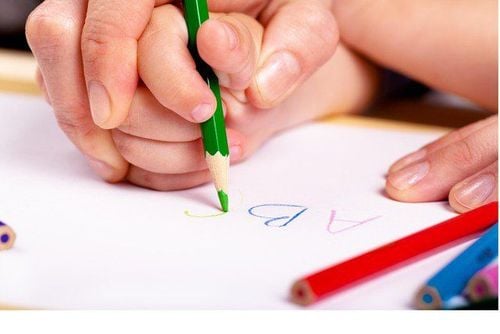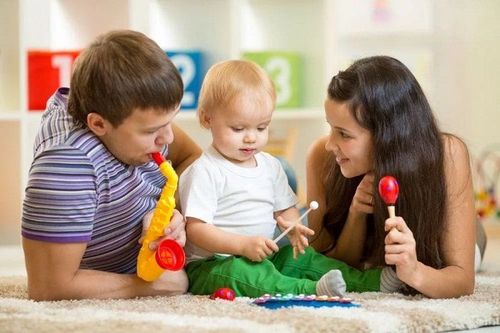This is an automatically translated article.
There are 4 stages of learning to write that children will go through, including: scribbling, controlled writing, letter writing, letter practice. Knowing what stage your child is at helps you best support your child in developing their writing skills. Your child's ability to write depends on his or her ability to master many literacy skills including letter recognition, print recognition, such as the spacing of words.1. Beginning stage: Scribbling (0 to 2 years old)
Children love to express their thoughts and ideas verbally. Putting those thoughts down on paper happens in stages, which depends on the child's rate of skill development.In the early stages of writing development, any scribbling or drawing a child does is considered writing. When children watch you and other adults write, they often imitate holding crayons and starting to scribble. This kind of pretend play shows that the child is thinking, “I can do that too.”
It's a pivotal moment when a child realizes his ideas can exist in written form. You'll know this is happening when you see your child scribbling or drawing while saying words or telling a story. During this stage, welcome any attempt at learning to write.
A great way to encourage your child to learn to write at this stage is to tell them, "Tell me what you wrote." Children love to share their stories and you will enjoy hearing the often complicated and fantastical thoughts behind those simple scribbles.
Keep paper and crayons or markers in easy reach so your child can start writing when interested. Pens and pencils are fine, but it's often easier for young children to handle thicker writing instruments.
You can also encourage your child by writing notes for them. A simple sentence that says "I love you!" And placing the note on the breakfast table can inspire a child to respond to another note.

Trong giai đoạn đầu tiên của sự phát triển kỹ năng viết, bất kỳ nét vẽ nguệch ngoạc hoặc vẽ vời nào mà trẻ làm đều được coi là viết
2. Controlled Writing Stage: Written Words (2 to 4 years old)
Is your child scribbling random letters on a page? This means that children are in the second stage of writing development, which usually occurs between the ages of 2 and 4. Children at this stage are already aware of the "squiggly" handwriting that adults write. is the letter. Children don't quite match the letters to their corresponding sounds - at least not consistently - but they begin to understand that letters play a special role in writing. At the beginning of this stage, children can still use other symbols such as drawings or squares. When a certain amount of progress is achieved, children begin to use only letters and become convinced that they are writing the same way that adults are writing.To encourage your child to develop writing skills at this stage, teach your child to write his or her name and help him understand that letters are used to make meaningful phrases. This also helps children move from scribbling to using letters. Once you've mastered that, you can move on to teaching your child to write words like "Mom", "Dad" and the names of other family members; or create signs together when you and your child are playing, such as a STOP sign when you are playing with a car.
Reading skills are also important at this stage. A great way to encourage reading in your child is to set aside time to read to them every day. In addition to encouraging children to love reading, reading aloud also inspires storytellers, helping children have a certain association when listening to stories. Children will begin to come up with their own imaginary stories.
Reading to children helps children realize that words are made up of letters and phrases with specific meanings. As you read the same story over and over, your child may begin to recognize some words. For many children, this repetition is not only a step to practice reading but also to develop writing skills. For example, when a child has seen the word "bug" in a story several times, they will begin to recognize the word. Once they recognize it, they can move on to writing paragraphs to tell their story about the bug.

Trẻ em ở giai đoạn 2-4 tuổi đã nhận thức được rằng những nét chữ “ nguệch ngoạc” mà người lớn viết chính là chữ cái
3. Transition stage: The letters put together form words (4 to 7 years old)
As children begin to realize that words are made up of words and that letters put together make words, they will stop using random letters in their writing. Instead, children begin to try to match the sounds they hear in a word with letters they know. This cognitive leap usually occurs between the ages of 4 and 7.During this period, children often reverse the letters or mix them together. Instead of just focusing on correcting your child's mistakes, you should focus on the joy of seeing your child make progress at this stage. Because mistakes like these are common at this age and part of the learning process. Encourage your child's writing and communication skills, and save the spelling lessons as they get older.
Encourage your child to perfect writing skills at this stage by making writing practice part of your play with your child, such as helping your child write the menu for a tea party with toys children's or a prescription for you while you are playing the doctor.

Khi trẻ bắt đầu nhận ra rằng các từ được tạo thành từ tiếng và các chữ cái ghép lại với nhau tạo thành từ, trẻ sẽ ngừng sử dụng các chữ cái ngẫu nhiên trong bài viết của mình
4. Proficiency stage: dictation (5 to 6 years old)
During this period (usually between the ages of 5 and 6), children begin to use spelling to create meaningful phrases. The spelling may not be exact, but children at this stage are aware that different spellings can have different meanings. Children will even begin to memorize some words, especially difficult but commonly used words, so that they can spell them correctly.Trying to push children to this stage too quickly can sometimes be frustrating for them, as they feel the need for perfect spelling. If you feel your child is struggling with pressure to spell perfectly, a great way to relieve the stress is to introduce them to drafts. You can emphasize that the first draft is for ideas only, and that the second draft is for spell checking.
This is also helpful for children to start memorizing common words. These words are used frequently and do not follow the basic rules of spelling. Memorizing these words will make spelling a lot easier.
To develop children's writing skills at this stage, parents need to encourage children to use writing to connect with people. Try writing short letters to each other, between family or friends. Another fun way to turn writing skills into a social activity is to write shared stories: You start by writing the first two or three lines of the story. Then your child writes a follow-up paragraph.
If your child is not at the writing stage and wants to play, he can dictate and you can write. Children think of story ideas much faster than they can write them down. When you write for your child, he or she will find it enjoyable to document his original stories. Over time, a child's ability to write will match their own thinking speed. But until that happens, reduce your child's frustration with himself by being supportive.
Any age mentioned above is only a general measure and is used as a general indicator. And parents need to remember: No two children are alike. The skills that children acquire will also vary. Therefore, children should not be compared with other children of the same age to avoid putting pressure on them.
Please dial HOTLINE for more information or register for an appointment HERE. Download MyVinmec app to make appointments faster and to manage your bookings easily.
Reference source: babycenter.com












